
18 Oct 2021 Research
Leukaemia UK drives forward progress for leukaemia research through five new John Goldman Fellowships for 2021
Leukaemia UK today announced five new John Goldman Fellows for 2021, from across the UK, to accelerate progress and stop the disease devastating lives. Innovators in their fields, each of Leukaemia UK’s John Goldman Fellows will explore a new angle to treating leukaemia over the next two years.
Leukaemia remains one of the deadliest cancers, with an overall UK survival rate of just over 50 per cent (2013-2017). Treatments are harsh and are still lagging behind other cancers in their success rates. Leukaemia is the most common childhood cancer, with it accounting for 33 per cent of all cancers in the under 14s.
Fiona Hazell, Chief Executive of Leukaemia UK, said:
“Whilst blood cancer is the fifth most common cancer in the UK, it remains the third most deadly. Further research is vital to improve survival rates in leukaemia as well as the quality of life for those who receive this devastating diagnosis. Leukaemia UK’s John Goldman Fellowships are novel research projects which will help accelerate progress through the development of much needed new and better treatments for leukaemia and other blood cancers, helping save and improve the lives of those living with the disease.”
Based across the UK in Birmingham, London, Edinburgh, York and Oxford, the new Leukaemia UK John Goldman Fellows are embarking on research projects ranging from looking at how more targeted drug treatments can be developed to treat acute myeloid leukaemia (AML) patients, to looking at the behaviour of leukaemia-associated immune cells called macrophages in infant leukaemia to see if they have a significant role in the onset or progression of the disease.
Leukaemia UK’s John Goldman Fellows for 2021 are:
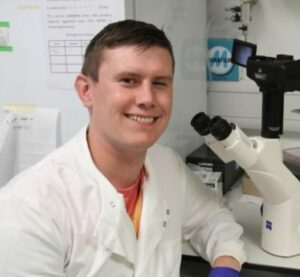 Dr Daniel Coleman of the University of Birmingham who will be looking at how drugs can be used to target the mutated signaling proteins in the cancerous cells in acute myeloid leukaemia (AML) patients. By targeting mutated RAS genes Dr Coleman hopes to block the pathway for leukaemia cells to grow and will identify further treatment targets to reduce the need for aggressive chemotherapy in vulnerable patients.
Dr Daniel Coleman of the University of Birmingham who will be looking at how drugs can be used to target the mutated signaling proteins in the cancerous cells in acute myeloid leukaemia (AML) patients. By targeting mutated RAS genes Dr Coleman hopes to block the pathway for leukaemia cells to grow and will identify further treatment targets to reduce the need for aggressive chemotherapy in vulnerable patients.
Dr Coleman said: “Acute myeloid leukaemia (AML) is a particularly aggressive blood cancer and most often affects elderly patients. It is frequently difficult to treat with aggressive chemotherapy as patients are often already quite frail. For this reason, it is important to develop treatments which target just the cancer cells and leave the healthy cells intact.”
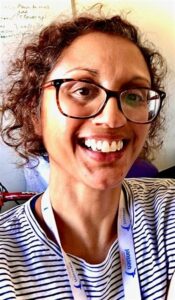 Dr Pramila Krishnamurthy of King’s College Hospital and King’s College London will be using the fellowship to better understand why some leukaemia patients relapse following a stem cell transplant, and how donor lymphocyte infusion can help prevent this. Her fellowship is co-funded by Rosetrees Trust.
Dr Pramila Krishnamurthy of King’s College Hospital and King’s College London will be using the fellowship to better understand why some leukaemia patients relapse following a stem cell transplant, and how donor lymphocyte infusion can help prevent this. Her fellowship is co-funded by Rosetrees Trust.
Dr Krishnamurthy said,“Over 50% of patients with acute leukaemias relapse after stem cell transplant, and once this occurs, the chance of cure is unlikely. Relapse can be prevented by infusing donor-derived immune cells after the transplant. During my John Goldman Fellowship I will explore the use of donor lymphocyte infusion to help correct defects in patients’ immune responses so that they are better able to fight their underlying cancer.”
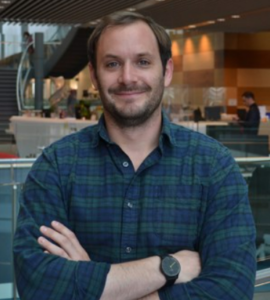 Dr William Grey of the University of York will be looking at how to attack leukaemic stem cells, the origin of leukaemia and the cells responsible for relapse after treatment, by targeting protein modifications and their breakdown.
Dr William Grey of the University of York will be looking at how to attack leukaemic stem cells, the origin of leukaemia and the cells responsible for relapse after treatment, by targeting protein modifications and their breakdown.
Dr Grey said: “In this fellowship funded by Leukaemia UK I will investigate specific targeting of leukaemic stem cells, leveraging an Achilles heel in their protein turnover machinery. In combination with newly available medicines, I aim to improve treatment options for the most elderly and at-risk AML patients.”
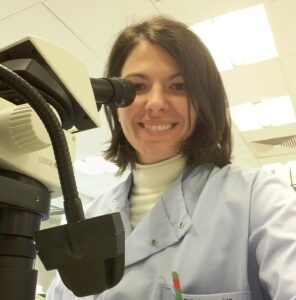 Dr Samanta Mariani of the University of Edinburgh will be investigating the role of leukaemia-associated immune cells called macrophages in chemotherapy-resistant cells in cases of infant leukaemia. She will look at these macrophages in infant leukaemia to see if they have a significant role in the onset or progression of the disease.
Dr Samanta Mariani of the University of Edinburgh will be investigating the role of leukaemia-associated immune cells called macrophages in chemotherapy-resistant cells in cases of infant leukaemia. She will look at these macrophages in infant leukaemia to see if they have a significant role in the onset or progression of the disease.
Dr Mariani said: “Acute leukaemias, the most common in infants and children, are difficult to treat. Chemotherapy is only able to eradicate the disease in half of infant cases. There is a critical need to understand what happens in the early stages of leukaemia’s development to better target the progression of the disease.”
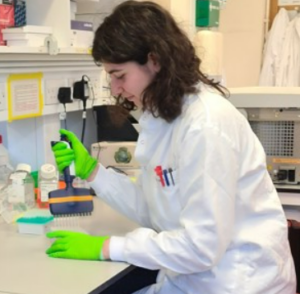 Dr Giulia Orlando of the University of Oxford will be looking at the changes that RAS genes induce in juvenile myelomonocytic leukaemia to see whether there is the possibility for more targeted treatments to improve patient outcomes.
Dr Giulia Orlando of the University of Oxford will be looking at the changes that RAS genes induce in juvenile myelomonocytic leukaemia to see whether there is the possibility for more targeted treatments to improve patient outcomes.
Dr Orlando said: “During my John Goldman Fellowship I will study a rare form of childhood cancer, juvenile myelomonocytic leukaemia (JMML), characterised by alterations in RAS genes within cells. No target treatment is currently available for this type of leukaemia, and the only curative option is bone marrow transplant. Even after transplant, 35% of patients relapse. By studying the molecular mechanisms behind RAS driven gene regulation, I hope that this research might lead to new targeted treatments being employed to improve patient outcome.”
You can read coverage of the story by Charity Today here.
Related posts
25 August 2020
Angela Smith-Morgan to step down from her role as Co CEO of Leukaemia UK
After eight successful years with us, Angela Smith-Morgan will be stepping down from her role as Co CEO of Leukaemia UK on 3rd September.
18 May 2022
World Blood Cancer Day interview with Dr Pramila Krishnamurthy
On 28th May the global blood cancer community comes together to mark World Blood Cancer Day, this campaign calls for support of those with blood cancer and encourages people to become stem cell donors.
18 September 2025
1 in 4 leukaemia patients in England experiences an avoidable delay in diagnosis
A first of its kind study, commissioned by Leukaemia UK, has revealed that a quarter (26%) of leukaemia patients in England experience avoidable delays in their diagnosis, resulting in a…
30 November 2023
Leukaemia UK invests in next generation of blood cancer trial leaders
This week, aspiring chief investigators of future cutting-edge blood cancer clinical trials took to Birmingham for the DIDACT Foundation’s inaugural Clinical Trials Workshop – an event funded by Leukaemia UK….